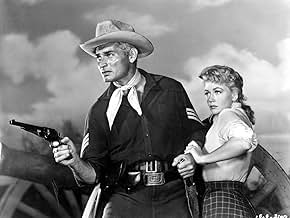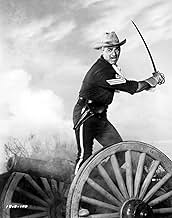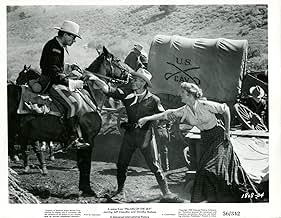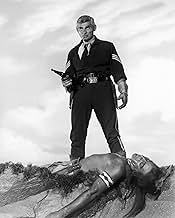IMDb RATING
6.2/10
829
YOUR RATING
In 1868 Oregon, after the Army violates the treaty by building a road across the reservation, several tribal chiefs decide to unite their forces against the trespassing whites.In 1868 Oregon, after the Army violates the treaty by building a road across the reservation, several tribal chiefs decide to unite their forces against the trespassing whites.In 1868 Oregon, after the Army violates the treaty by building a road across the reservation, several tribal chiefs decide to unite their forces against the trespassing whites.
- Director
- Writers
- All cast & crew
- Production, box office & more at IMDbPro
Featured reviews
Near the Oregon Trail in what is now southeastern Washington and northeastern Oregon, tribal leaders are upset by the movements of a new cavalry officer and his troops, which break the treaty. An established First Sergeant whom the Indians trust (Chandler) tries to keep the peace, but war is inevitable. Lee Marvin is on hand as a young sergeant while Michael Ansara plays a hostile chief.
"Pillars of the Sky" (1956) came in the tradition of John Ford's Cavalry Trilogy from 1948-1950 and the ensuing "Warpath," as well "The Last Frontier" (aka "Savage Wilderness"). While it's arguably just as worthwhile as the Cavalry Trilogy in its own unique way, it's not as compelling as the other two.
Some of the key actors playing American Indians are Lebanese, Latino, Tennessean, and a New Yorker, but one is a Kickapoo and there are some other genuine Indian peripherals. Overall, their depiction is well done. Meanwhile Chandler's character is supposed to be an alcoholic, but he doesn't look or act like a typical functioning alcoholic, such as Ulysses S. Grant. Actually, Jeff is towering and god-like as the commanding noncommissioned officer, despite his drinking.
There's a love triangle thrown into the mix involving Chandler, Dorothy Malone and Keith Andes. While this might cause some eye-rolling, I'm pretty sure there were one or two love triangles during the decades of the Indian Wars. Speaking of rolling your eyes, there's some lame (and incongruous) comedy involving a raw recruit and his horse, but it's so minor it can be overlooked.
The best thing about this Western is the superb authentic locations and the muscular action. But I also liked the emphasis on Christianity with Ward Bond playing the missionary-physician. You'd never see this today, of course, as it's a great sin now to show Christianity in a positive light. Get real.
It runs 1 hour, 26 minutes (the version I watched), and was shot in northeast Oregon at Joseph and nearby Wallowa Lake, as well as LaGrande, which is to the west of there. Studio scenes were done at Universal Studios in the Los Angeles area.
GRADE: B-
"Pillars of the Sky" (1956) came in the tradition of John Ford's Cavalry Trilogy from 1948-1950 and the ensuing "Warpath," as well "The Last Frontier" (aka "Savage Wilderness"). While it's arguably just as worthwhile as the Cavalry Trilogy in its own unique way, it's not as compelling as the other two.
Some of the key actors playing American Indians are Lebanese, Latino, Tennessean, and a New Yorker, but one is a Kickapoo and there are some other genuine Indian peripherals. Overall, their depiction is well done. Meanwhile Chandler's character is supposed to be an alcoholic, but he doesn't look or act like a typical functioning alcoholic, such as Ulysses S. Grant. Actually, Jeff is towering and god-like as the commanding noncommissioned officer, despite his drinking.
There's a love triangle thrown into the mix involving Chandler, Dorothy Malone and Keith Andes. While this might cause some eye-rolling, I'm pretty sure there were one or two love triangles during the decades of the Indian Wars. Speaking of rolling your eyes, there's some lame (and incongruous) comedy involving a raw recruit and his horse, but it's so minor it can be overlooked.
The best thing about this Western is the superb authentic locations and the muscular action. But I also liked the emphasis on Christianity with Ward Bond playing the missionary-physician. You'd never see this today, of course, as it's a great sin now to show Christianity in a positive light. Get real.
It runs 1 hour, 26 minutes (the version I watched), and was shot in northeast Oregon at Joseph and nearby Wallowa Lake, as well as LaGrande, which is to the west of there. Studio scenes were done at Universal Studios in the Los Angeles area.
GRADE: B-
This fine western is a cavalry-Indian affair that has the usual treaty-breaking by the government as it builds a road and fort on Indian land that causes an uproar and leads to war. The military's action sets in motion cavalry-Indian hostilities and the tribes gather for an attack on the fort. Many of the Indians have been baptised and converted to Christianity by a white missionary and live in peace with the soldiers, many serving as scouts under a sergeant played by Jeff Chandler. Complicating matters are two white women the Indians hold as hostages who are at great risk should war break out. Chandler did some his best work in westerns and is the lieutenant whom the Indian soldiers respect and follow faithfully. Chandler's flirtation with a married woman, played by Dorothy Malone, doesn't have much to do with the story other than to give the leading man a romantic interest. Ward Bond, Michael Ansara and Keith Andes are good in supporting roles. Oregon's scenic beauty is on display in this CinemaScope film.
That scene,when the good doctor courts danger ,when he comes towards an army of angry bloodthirsty Indians ,strongly reminds you of that scene in "the war of the worlds" (1953) when Uncle Matthews ,the minister ,faces up to the Martians ,a Bible and a cross in his hands .But those Indians were supposed to be Christians whereas the ETs were not .Which would tend to show that religion does necessarily calm people down !Jeff Chandler is efficient as sergeant Bell but the love affair is totally bland and Dorothy Malone is totally wasted (hardly 10 lines to say in the whole movie)-she would win an AA for her next movie the famous "written on the wind" melodrama -.Some (Indian only) sadism in certain scenes.
Pillars of the Sky is an unusual western in that it touches on the role of Christian missionaries in the American West. This film also gives Ward Bond one of the most unusual roles he ever had in his career.
Bond plays a Christian missionary preacher/doctor in the Pacific Northwest region. There is still considerable debate among historians as to what they accomplished. It was thought at the time that the conquered Indian tribes would be more humanely treated under preachers than soldiers. There is no doubt that missionaries, not only in the American west, but in other parts of the world colonized by the west, probably saved indigent peoples from some acts of barbarism.
Whether though, even with the best of intentions, they had the right to destroy a culture is very much open to debate. And Bond is a man with the best of intentions even as he baptizes the Indians giving them names found in the Bible.
One Indian who isn't having any of it is Michael Ansara who's rousing all the tribes to resist the building of a new army post in their territory. But Colonel Willis Bouchey has his orders and Bond is caught in the middle.
Another trio caught in the middle is Captain Keith Andes, his wife Dorothy Malone, and Sergeant Jeff Chandler who Malone was previously engaged to. Malone and Olive Carey are captured by Ansara's bunch and Chandler rescues them. This little romantic subplot is exactly what the cavalry doesn't need as Ansara's band is on the hunt for them.
Pillars of the Sky was filmed on location in the Pacific Northwest and the photography is first rate. And the Indian attacks are well staged by some very smart Indians. Ansara is a cunning and ruthless foe.
It also succeeds in making you admire the courage of our cavalry in carrying out their orders though in fact they are in clear treaty violation. One of the best roles in the film is that of Lee Marvin, an army veteran from the Civil War who is giving the green troops some lessons for survival in a hurry.
I did find it a bit much the end Jeff Chandler has in store for him and I think most viewers will also. As Chandler said, Bond may have given the Indians the priceless gift of his God, but was the cost worth it?
Bond plays a Christian missionary preacher/doctor in the Pacific Northwest region. There is still considerable debate among historians as to what they accomplished. It was thought at the time that the conquered Indian tribes would be more humanely treated under preachers than soldiers. There is no doubt that missionaries, not only in the American west, but in other parts of the world colonized by the west, probably saved indigent peoples from some acts of barbarism.
Whether though, even with the best of intentions, they had the right to destroy a culture is very much open to debate. And Bond is a man with the best of intentions even as he baptizes the Indians giving them names found in the Bible.
One Indian who isn't having any of it is Michael Ansara who's rousing all the tribes to resist the building of a new army post in their territory. But Colonel Willis Bouchey has his orders and Bond is caught in the middle.
Another trio caught in the middle is Captain Keith Andes, his wife Dorothy Malone, and Sergeant Jeff Chandler who Malone was previously engaged to. Malone and Olive Carey are captured by Ansara's bunch and Chandler rescues them. This little romantic subplot is exactly what the cavalry doesn't need as Ansara's band is on the hunt for them.
Pillars of the Sky was filmed on location in the Pacific Northwest and the photography is first rate. And the Indian attacks are well staged by some very smart Indians. Ansara is a cunning and ruthless foe.
It also succeeds in making you admire the courage of our cavalry in carrying out their orders though in fact they are in clear treaty violation. One of the best roles in the film is that of Lee Marvin, an army veteran from the Civil War who is giving the green troops some lessons for survival in a hurry.
I did find it a bit much the end Jeff Chandler has in store for him and I think most viewers will also. As Chandler said, Bond may have given the Indians the priceless gift of his God, but was the cost worth it?
A rather sombre film for veteran director George Marshall, set in Oregon in 1868.
In a well-acted film, Ward Bond is particularly good in a sympathetic role as a preacher; and even Lee Marvin is permitted a touching scene as one of the troop.
In a well-acted film, Ward Bond is particularly good in a sympathetic role as a preacher; and even Lee Marvin is permitted a touching scene as one of the troop.
Did you know
- TriviaBetween takes, Ward Bond argued with Lee Marvin that the US should attack the Soviet Union because of what Bond claimed to be the Communist threat. Marvin, an ex-Marine who served in World War II, was wounded in the fighting on Saipan against the Japanese,. He asked Bond--who had never spent a day in the military due to epilepsy, --how he spent the war. Bond had no real reply, and Marvin pointed out that the only thing Bond knew about war was what he pretended to fight on studio back lots.
- GoofsThe cavalry had a Red Cross wagon. The American Red Cross was not founded until 1881.
- ConnectionsFeatured in Cuba (1979)
- SoundtracksBugle Calls
(uncredited)
Composer unknown
Details
Box office
- Gross US & Canada
- $1,500,000
- Runtime1 hour 35 minutes
- Aspect ratio
- 2.35 : 1
Contribute to this page
Suggest an edit or add missing content





































